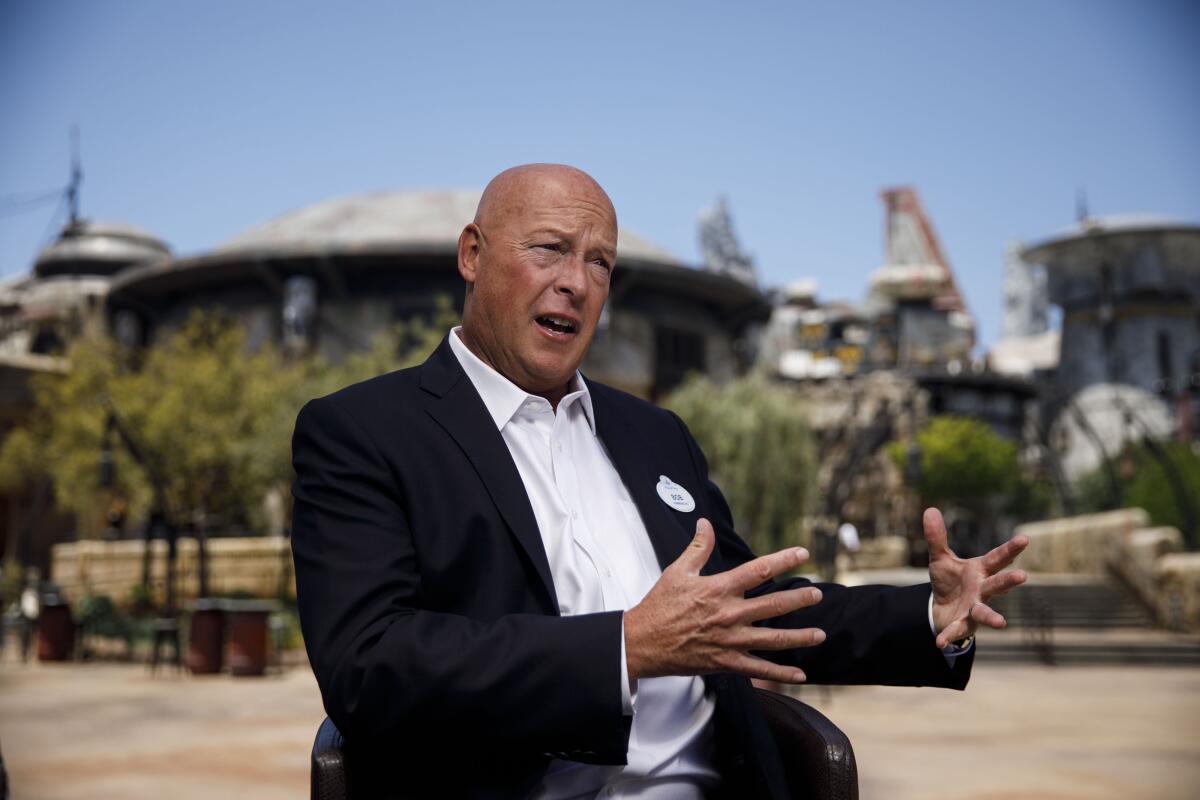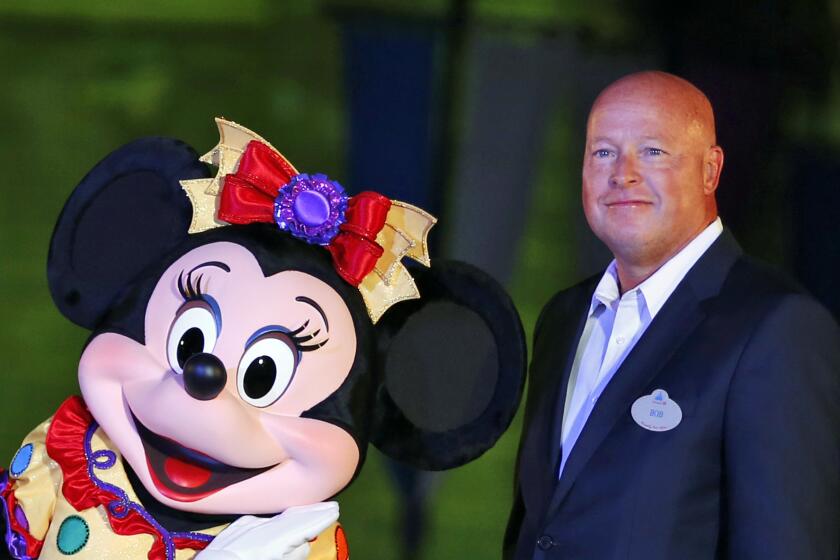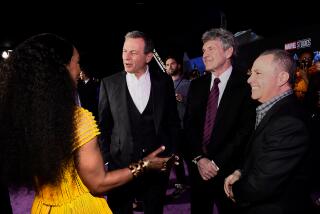Disney is not alone. Young employees in revolt are holding bosses’ feet to the fire

Bob Chapek said he didn’t want Walt Disney Co. to be a “political football.” It became one anyway.
The chief executive of the world’s most powerful entertainment company this week became an unwilling flashpoint in the debate over Florida’s controversial bill restricting classroom instruction on sexual orientation and gender identity.
LGBTQ advocates say the bill is an attack on gay and transgender kids as well as teachers, while supporters say they’re defending parental rights.
The bill forbids instruction on sexual orientation or gender identity in kindergarten through third grade “or in a manner that is not age appropriate or developmentally appropriate for students in accordance with state standards.” Parents could sue school districts for violations.
Disney, which has tens of thousands of employees in Florida, at first refused to take a public stance. Chapek on Monday told staff in an email that corporate statements “do very little to change outcomes or minds” and instead are “often weaponized by one side or the other to further divide and inflame.”
Backlash was swift among the bill’s critics. But it would be one thing if the anger at Disney’s muted response came solely from outside activists who oppose Florida’s legislation, which they’ve dubbed a “Don’t Say Gay” bill. But as so often happens nowadays in corporate life, the loudest calls came from inside the Mouse House.
Employees said they were ‘hurt’ by Bob Chapek’s response to a Florida bill that would limit instruction of sexual orientation and gender identity.
LGBTQ employees of Pixar, in a letter to Disney leadership, said they were “disappointed, hurt, afraid, and angry” about the company’s stance and demanded that Disney discontinue its financial support for lawmakers who supported the bill. Individual employees, including writers for Disney shows, expressed their dismay on Twitter and in online videos.
By first declining to take a public stand — only to later say the company opposed the legislation all along — Chapek found himself in his biggest imbroglio since becoming chief executive of the Burbank entertainment giant two years ago.
Chapek apologized to staff Friday and said the company would pause all political donations in Florida as it reassesses its advocacy policies.
“Speaking to you, reading your messages, and meeting with you have helped me better understand how painful our silence was,” Chapek said in an email obtained by The Times. “It is clear that this is not just an issue about a bill in Florida, but instead yet another challenge to basic human rights. You needed me to be a stronger ally in the fight for equal rights and I let you down. I am sorry.”
Chapek could trade notes with Netflix co-CEO Ted Sarandos and Spotify chief Daniel Ek. Both executives have waded through internal blowback when business priorities clashed with liberal social values. Sarandos for weeks took heat for his support of Dave Chappelle after the comedian’s comments were seen as transphobic. Ek faced pressure over podcaster Joe Rogan’s comments on COVID-19 vaccines, race and gender.
The lesson for companies: ignore employees’ pain at your peril.
Not long ago, it would have been unthinkable for people to call out their CEOs publicly for decisions they didn’t like. But as Disney’s trial by fire and other examples show, higher-ups are increasingly contending with a socially conscious and internet savvy generation of employees who want their workplaces to reflect their most deeply held beliefs and are willing to say so online.
“In addition to being more tech savvy, they seem to be also more collaborative, more mutually accountable and more acutely aware of hypocrisy when they see it,” said Jay Tucker, executive director of UCLA Anderson’s Center for Media, Entertainment & Sports. “They’re not afraid to hold their bosses and their boss’ bosses accountable when they feel like something’s not appropriate. That’s a noticeable and significant shift in the way workers approach these kinds of issues.”
That change has come about largely because of the generation that came after millennials, said Morley Winograd, an expert on generational shifts with the University of Southern California.
The new generation “plurals,” also known as Gen Z, is more diverse than its predecessors in terms of race and gender identity. Today’s young people entering the workforce are more confrontational than their elders in pushing for social change and much more likely to put pressure on their employers to act.
“The younger generation recognizes that their company has a major impact on the world, and if their company was better — as in, more in line with their values — the world would be better,” said Winograd, senior fellow at USC’s Annenberg School Center on Communication Leadership and Policy. “They also recognize the power they have as consumers, particularly of entertainment and all forms of entertainment consumption, which pretty much sums up Disney.”
The reaction to Disney’s statements follows a familiar pattern.
Netflix employees and activists last year staged a virtual walkout to protest Chappelle’s comedy special, “The Closer,” which included multiple bits that transgender people and allies said were harmful to the community. The protest came after Sarandos sent an email to staff defending the decision to air the special, saying, “we have a strong belief that content on screen doesn’t directly translate to real-world harm.”
Sarandos later acknowledged he “screwed up” in his handling of employee concerns but stood by the decision to host “The Closer” and balked at the notion of adding a content disclaimer. Netflix recently said Chappelle will host and produce a new series of comedy specials for the Los Gatos-based streamer. He also will kick off a planned Netflix comedy festival.
Two transgender employees who were most vocal in their criticism no longer work at Netflix. Game-launch operations program manager B. Pagels-Minor was fired for allegedly leaking internal data, a charge Pagels-Minor denied. Software engineer Terra Field resigned after a labor complaint Field and Pagels-Minor filed against Netflix was withdrawn.
Employees of video game giant Activision Blizzard staged walkouts to protest the company’s response to allegations of pervasive discrimination and harassment against women. Microsoft has agreed to acquire the Santa Monica company for $69 billion.
Less public was the internal tumult at Swedish audio streaming service Spotify, where Ek was questioned for supporting Rogan and his popular podcast, which the streamer distributes exclusively.
Spotify weathered a month of drama after artists like Neil Young and Joni Mitchell boycotted the service, leading to debates among Spotify employees even after the company revealed its content-moderation guidelines and promised new labeling on pandemic-related shows.
But while Spotify, Netflix and Activision all create popular entertainment, none is quite like Disney. Fans have an emotional connection to Disney, which has a nearly 100-year history and has produced movies beloved by multiple generations.
People now in their mid-30s and younger grew up during a renaissance of Disney animated moviemaking that spanned from “The Little Mermaid” to “Tarzan.” Many of those people work at Disney. Those who choose to work for Disney go there because they believe in spreading joy,” said UCLA’s Tucker. That — coupled with Disney’s massive employee base — gives Disney a level of cultural power that few companies can match.
“There’s a lot of cultural significance there,” Tucker said. “People genuinely feel like there’s something at stake when a brand of that consequence finds itself on one side or another of an issue. That is unique because there aren’t too many other brands where people would care what the brand has to say.”
This is not the first flare-up for Disney, which has long had to walk a tightrope when it comes to political activism. After all, many of the people who watch Disney movies and trek to its theme parks every year are socially conservative. Taking an aggressive stand on a cultural wedge issue could mean alienating some of Disney’s audience.
And now the fears that Disney would become a target of the right have come true. Florida Gov. Ron DeSantis blasted Chapek’s comments in an appearance before supporters in Boca Raton and attacked the company for its silence on human rights abuses in China, where it does massive business.
“In Florida, our policies [have] got to be based on the best interest of Florida citizens, not on the musing of woke corporations,” said DeSantis, who is believed to be poised for a presidential run in 2024. Conservatives see the Parental Rights in Education bill as a winning issue in the state, which is far more conservative than Disney’s California base.
The desire for the widest possible audience has not stopped Disney from weighing in on culture war matters in the past.
Chapek’s predecessor, Bob Iger, who ran the company for 15 years and at one point harbored presidential aspirations, threatened to stop producing movies in Georgia in 2016. The state passed a bill, seen by many as anti-gay, to expand individuals’ and business’ rights to deny services to those whose way of life conflicts with their religious beliefs. Gov. Nathan Deal vetoed the bill.
Years earlier under Michael Eisner, Disney would come to embrace loosely organized Gay Day celebrations at its parks in Orlando and Anaheim, despite the protests of churches and conservative organizations. Disney has a long history of cachet with the LGBTQ community, with its many characters — particularly animated villains — that have been read as queer-coded.
Which is partly why there’s so much attention on how Disney makes decisions that affect queer people inside and outside of the company.
Chapek, in his initial email, argued that Disney could more effectively bring about social change through movies and shows like “Encanto” and “Love, Victor.” But the Pixar employee letter took issue with that statement and accused Disney of censoring depictions of overtly LGBTQ affection in Pixar content.
Some Hollywood insiders say Chapek’s bungled response reflects a lack of experience in the creative side of Hollywood before taking the CEO job. Chapek, an Indiana native and Michigan State University MBA, succeeded Iger after decades at Disney running operations including theme parks, consumer products and home video distribution.
“That doesn’t mean that Chapek is a bad person or someone who can’t lead Disney,” said Gavin Polone, an outspoken film and TV producer known for projects including “Curb Your Enthusiasm.” “But it does mean that this has to be an experience from which he gains a broader perspective that will inform his future decisions, or there will certainly be long-term consequences for him and Disney.”
More to Read
Inside the business of entertainment
The Wide Shot brings you news, analysis and insights on everything from streaming wars to production — and what it all means for the future.
You may occasionally receive promotional content from the Los Angeles Times.








